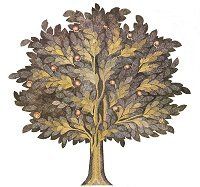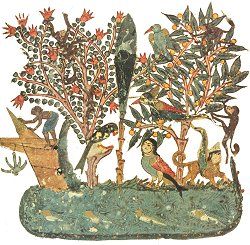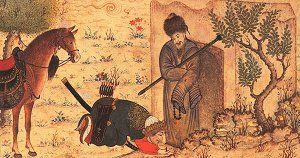Serving the Guest: A Sufi Cookbook
Essays | Recipes | Gallery
and yours is a cook's garden of poetic herbs.
Repetitive? Yes, but one need not fear repetition
in poetry which can only improve the more we read.
God seasons the pot of earth with tastes, smells, colours — apples, oranges, walnuts, quince and pomegranate;
the grapes of the vine never clog your palate
even if they taste the same as last year's
or the year before...
Sufi teachings and literature abound with metaphorical references to food and eating. Ibn 'Arabi identifies lubb, or kernel, as knowledge protected from hearts tied to the world. Lubb al-lubb, "the kernel of the kernel," is the substance of divine light. Simsimah, a sesame seed, is a realization too subtle for expression; and dhawq, or taste, is a human being's direct experience of Divine grace and unity.
Of dhawq and its companion shurb (drinking), Hujwiri wrote:
More than eight centuries later, a Turkish Bektashi teacher expounded on the same subject:
In another application of food as metaphor, the Bektashi poet Yunus Emre wrote, somewhat cryptically:
and ate the grapes I found there.
The owner of the garden called to me,
"Why are you eating my walnuts?"
The Helveti Shaikh Niyazi Misri offered this interpretation:

The transforming power of love and gratitude is illustrated in Mevlana Jelaluddin Rumi's tale of Luqman. Though born a slave, Luqman "was the master of himself, and free from sensual desire." His master recognized his qualities, and sought to emulate him as a dervish might seek to emulate the Shaikh. Whatever food was brought to the master, he would first send to Luqman to eat; the master would then eat Luqman's leavings, and be overcome with rapture. If the slave rejected a food, his master would also refuse it or not enjoy it — "This is the sign of affinity without end." Given a melon, Luqman ate with pleasure all but the last slice. When the master tasted that slice, he was overwhelmed by its sourness. To the question, "How could you have eaten this poison?" Luqman replied:
that I am bent over in shame.
How could I refuse even one bitter thing from you?
If I were to complain of bitterness,
I should be engulfed in the dust of a hundred roads!
Your sugar-scattering hand gave that melon its grace —
how could any bitterness be left in it?
By love the bitter is made sweet.
Food also plays a part in legends of the saints. Tales of miraculous feedings enrich the biographies of many Sufis and mirror similar stories from the life of Muhammad. Images of material abundance manifested by those of spiritual attainment are emblems of the potential of each human being to manifest Divine grace in his or her life.
The Prophet Muhammad
Rabi'a al-Adawiyya
Mansur al-Hallaj
Mevlana Jelaluddin Rumi
Abdul Qadir Gilani
Hasan of Basra
Khwaja Qutubuddin Bakhtiyar Kaki
Kabir
from Serving the Guest: A Sufi Cookbook
Copyright © 1999, 2000 by Kathleen Seidel
Sources of previously published material by other authors used by permission, and print sources for images, may be found at http://www.superluminal.com/cookbook.

